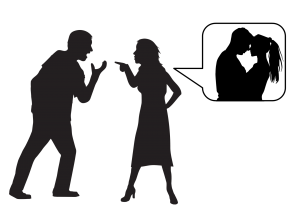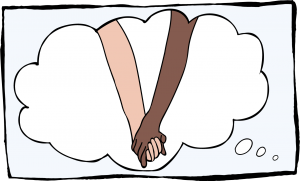jealousy
Jealousy is one of the strongest emotional behaviours in humans and other higher animals. People experience jealousy when they notice that the person they love also loves someone else. A child is jealous when its parents pay attention to a younger sibling. A woman feels jealous anger when she finds out that her husband has a secret love affair at the office. A boy can become enraged with jealousy when all he sees is ‘his girl’ laughing with another man. The behaviour that accompanies this emotion is more or less the same for all people, irrespective of their age, sex, culture. Jealousy is something everybody knows, just like hunger and desire.
Jealousy: fear of being left alone
 Jealousy is a mixture of fear and anger. The fear is that of being left alone. This begins in childhood. A child demands care and attention, and it is in its mother’s nature to provide these. This is called mother love. It is said to be an unconditional form of love that creates a strong emotional tie between mother and child. The child is said to love its mother because it is happy whenever its mother is near. It also makes the mother happy to provide this kind of attention to the child.
Jealousy is a mixture of fear and anger. The fear is that of being left alone. This begins in childhood. A child demands care and attention, and it is in its mother’s nature to provide these. This is called mother love. It is said to be an unconditional form of love that creates a strong emotional tie between mother and child. The child is said to love its mother because it is happy whenever its mother is near. It also makes the mother happy to provide this kind of attention to the child.
Jealousy: need of love
In reality, however, a mother is not able to give her child all the love that it asks for. This can be due to illness or problems, or because other matters demand her attention. Besides, she cannot always be loving because it is her responsibility as a parent to teach the child obedience, awareness of potential dangers as well as the rules of her society. Also, a mother has ties with others, for instance her husband, her own mother, her other children. As a consequence, she has to divide her attention. Finally, she does not merely want to provide love but also to receive love for herself For every grown-up is also a child in need of love. Every child (and adult), therefore, experiences a shortage of love during childhood, and has become frightened and angry in private relations. Childhoods can be relatively joyful and safe, but more often than not they are demonstrably deficient, breeding an animal-like fear of abandonment. This fear is biologically functional because a single individual is more vulnerable than a couple or a group, but from a human point of view it is an extremely destructive force.
Jealousy in puberty
Childhood experiences determine our behaviour in relation to others. During puberty a sexual component is added. The need for a secure friend who can be trusted like a mother is combined with the strong innate desire to have sexual intercourse with someone of the opposite sex (sometimes of the same sex). Adolescent love is a mixture of overwhelming sexual desire and the need for a caring person. The ideal partner for both sexes is someone who can fulfill both needs. The problem is that many adolescents have not yet fully developed the ability to provide care to someone, and thus cannot fulfil completely the partner’s need for a fully committed parentlike person. Fear and anger are the result when this this need is frustrated, and thus jealousy is a common and vehement type of emotional behaviour during adolescence.
Jealousy plays an important role in reproduction

Jealousy in the future
Life would be happier if jealousy did not exist. Jealous behaviour generally has a negative impact. It often leads to conflicts, depression and revenge. Socially, it leads to loneliness where multiple friendship and solidarity might have been. In the most extreme cases, jealousy leads to violence, murder or suicide. In the least extreme cases it reduces our freedom and love for the other. If we want to overcome these restrictions imposed upon us by nature, it is invaluable to conquer jealousy. However, because of its strong roots in family relationships, we will never succeed if we do not profoundly change the biological family system itself. This is a task for the future.

